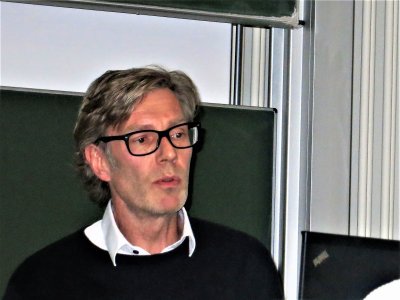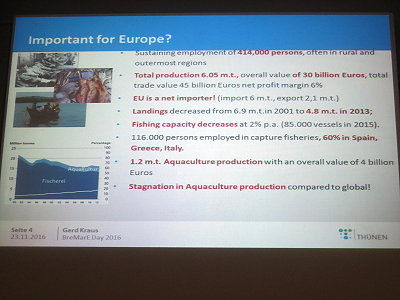Resources in European Seas (Status of major fish stocks)
 Prof. Gerd Kraus of the Thünen Institute in Hamburg spoke about the resource situation in European seas. He started out with an overview of the global fisheries and aquaculture sectors taken from the last FAO report on The State of World Fisheries and Aquaculture 2016.
Prof. Gerd Kraus of the Thünen Institute in Hamburg spoke about the resource situation in European seas. He started out with an overview of the global fisheries and aquaculture sectors taken from the last FAO report on The State of World Fisheries and Aquaculture 2016.
He highlighted that fisheries and aquaculture sustained the livelihood of about 10 to 12 per cent of the global population with total aquatic food production reaching about 150 million tons. The revenue at point of first sale was estimated at US$ 129.2 billion. Fisheries products were among the most traded commodities.
Of the 93.7 million tons of produce from capture fisheries 80 million tons were from marine waters. Aquaculture production for food amounted to about 66.6 million tons, mostly in Asia, while algae production reached 23.8 million tons. Half of the aquatic food for human consumption now came from aquaculture.
He then continued with some indicators for Europe. Within the EU, the fisheries and aquaculture sectors accounted for approximately 414,000 jobs, mostly in rural and outermost regions. Employment in capture fisheries was 116,000 persons, with 60 per cent of these in Spain, Greece and Italy. The annual production reached about six million tons worth Euro 30 billion. Unlike the global aquaculture trend production in Europe was mostly stagnant, though of high per-unit price. More than 70 per cent of the consumption of fisheries products in the EU depended on international imports.
Fishing capacity decreased by about two per cent per year in recent times. The 85,000 strong fishing fleet in 2015 was composed mostly of small boats. Only a few big companies are profitable, while the economic situation for all others is rather tight, if not outright negative.
As for fisheries management in the EU, he was rather cautious if not pessimistic that it would improve in the short term. This, according to Prof. Kraus, is because striving for maximum sustainable yield (MSY) was not a good objective due to the multi-species nature of many fisheries. He also feared that while the discard ban was well-intended, it would increase false declarations and other tricks to avoid the negative economic effects. The management machinery was quite unwieldy and had difficulties handling the multiple and often competing demand for space and resources not only from intensive fishing, but also wind farms, gas and petroleum extraction, submarine cables, recreation, commercial traffic and much else.
 The grand challenges in the longer term according to the speaker were climate change, multi-use management and sustainable food production from the ocean.
The grand challenges in the longer term according to the speaker were climate change, multi-use management and sustainable food production from the ocean.
Climate change: The upper 2000 meters of water in the ocean took up 90 per cent of the temperature increase engendered by greenhouse gas emissions. The temperature increase goes hand in hand with acidification, altered water mass transport, and frequent extreme events will affect marine ecosystems. We should expect more changes in the distribution patterns of marine organisms, globally reduced productivity, biodiversity and ecosystem services to name but the most obvious effects.
Multi-use management e.g. in the heavily exploited German North Sea segment struggles to accommodate 4000 hours of bottom trawling, wind installations for 25,000 MW wind energy, 900 ships sailing in the North Sea at any one time and more.
Ecological processes and human interventions operate at different scales and our unterstanding of cumulative effects on ecological and socio-ecological systems is still in its infancy. Cross-sectorial research is therefore needed to develop governance and management systems that can cope with multiple human and other demands and finding acceptable trade-offs between justice, prosperity and systemic sustainability.
Feeding humanity without destroying the ecosystems we rely on: As it seems that there is an upper limit of food the ocean can provide on a sustainable basis through capture fisheries, we need to explore how to feed humanity projected to reach or even surpass 10 billion people in the next few decades. Will the expected gap be filled through aquaculture? Prof. Kraus thinks that global strategies should look at fisheries and aquaculture in more integrated ways, consider the working of markets and approach the management challenge more from the perspective of the end product than the resources per se.








